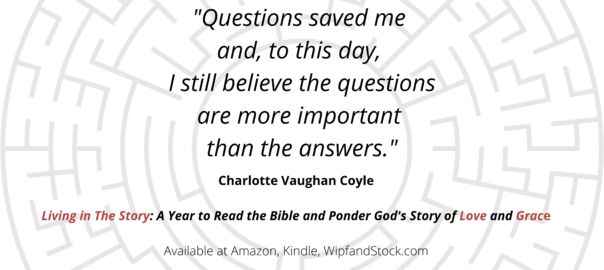Back when I was pastoring congregations, I would tell our church folks learning how to do youth ministry, “Your job is not to give young people answers. Your job is to help them ask good questions.”
Asking-Seeking-Knocking always has been how people of faith do faith well. Asking good questions is part of what it means to be human.
In my new book, Living in The Story: A Year to Read the Bible and Ponder God’s Story of Love and Grace, I tell my own story about discovering the life-giving goodness of questions. As a girl, I was taught that the right answers were more important than the questions, but as a young woman I learned I am the kind of person who needs questions more than I need answers. Now that I’m older, I realize that it has been in and by and because of the questions that I have grown to love the Bible even more.
One of the things I say in my book is that the Bible asks the big questions: Who is God? and Who are we? I think the Bible asks these questions because these are core questions most humans have been asking in some form or another throughout human history. We may call God different names, we may understand God in various ways, but the questions remind us that we humans will never fully grasp the mysteries of the universe. We may tend to focus on our human differences, but the questions push us to ponder how much we have in common.
Good questions nudge us to keep asking-seeking-knocking.
Honest questions keep us humble.
One of my favorite sister seekers was Rachel Held Evans. She, like I, found joy in a spiritual journey that offers the freedom to question, challenge, doubt, and even argue with faith traditions and biblical interpretations that seemed to be set in stone. In a blog she wrote on Doubt in April 2013, she pointed out: “most young adults I know aren’t looking for a religion that answers all of their questions, but rather a community of faith in which they feel safe to ask them.” That’s my experience as well. Loving, accepting community gives us all safe places to explore the questions, large and small. Whether that community happens in a church, a school, a family, or a friends’ group, we humans are at our best when we find—and when we create—safe spaces to grow and change and become our fully authentic selves.
I grieve the fractures in our human communities these days, divisions that are stifling human flourishing in too many ways. We need more safe places to ask our questions. We need more safe people to love us even when we find different answers. As I say in my book, one of the big questions woven throughout the Bible is: Who are we?
Not just who am I individually but who are we together—human creatures created by a good Creator? Who are we together—vastly diverse and yet each and every one of us made in the image of the Creator? Who are we together—deeply connected within our shared humanity?
As we continue to ask good questions like these, may we begin to heal some of the fractures that tear us a part. May we come together to thrive and flourish as fellow humans, as sisters and brothers.
May we become safe people for one another.

Amen and Amen!